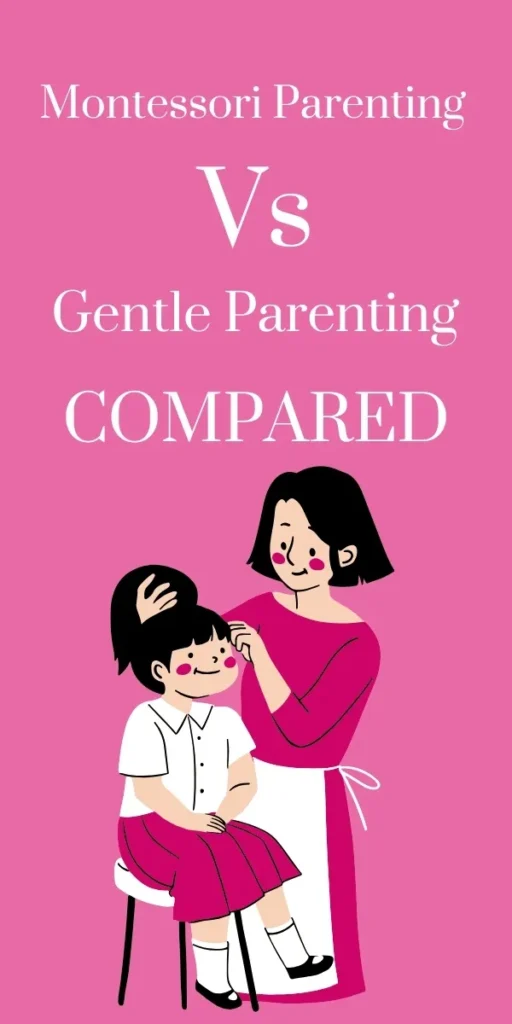Montessori Parenting Vs Gentle Parenting, Which is Right? – A Quick Answer
Montessori parenting and gentle parenting are distinct yet complementary approaches to raising children. They share core values such as encouraging independence, empathy, and respect, but they differ in their implementation and emphasis.
Montessori Parenting:
- Focuses on creating a prepared environment that supports self-directed activity, hands-on learning, and cognitive, emotional, and social development.
- Emphasizes the importance of allowing children to learn at their own pace and through their own interests.
- Uses minimal intervention and guidance from parents, promoting self-motivation and self-discovery.
- Encourages parents to provide opportunities for children to develop problem-solving skills, concentration, and order.
Gentle Parenting:
- Places greater emphasis on understanding and communicating with children, aiming to build strong, loving connections.
- Encourages parents to respond with empathy and respect, avoiding harsh punishment and reward systems.
- Promotes positive reinforcement, open dialogue, and collaboration between parents and children.
- Seeks to address underlying issues causing misbehavior rather than simply addressing symptoms.
Both approaches recognize the importance of respecting children’s rights and dignity, valuing their opinions, and supporting their development holistically.
Neither method is inherently superior, and parents should consider adopting elements of both to meet their family’s needs. Ultimately, the success of either approach depends on the dedication and skill of the parents implementing it.
When embarking on the incredible journey of parenthood, many seek approaches that foster healthy development and instill positive values in their children.
Two philosophies often garner attention: Montessori parenting and gentle parenting. Both advocate for respect, empathy, and nurturing guidance, but with distinct nuances. So, which approach is right for you?
Understanding the Core Philosophies: A Glimpse into Their Foundations
Montessori parenting draws inspiration from Dr. Maria Montessori’s educational philosophy. It emphasizes:

- Respect for individual development: Children are seen as capable individuals with unique learning styles and paces. Parents act as guides, observing and providing opportunities for self-directed exploration.
- Prepared environment: The home becomes a learning haven, equipped with age-appropriate materials and activities encouraging independent exploration and discovery.
- Natural consequences: Children learn through natural outcomes of their choices, fostering responsibility and problem-solving skills.
- Focus on independence: Everyday tasks and decision-making opportunities empower children to become self-reliant and confident individuals.
Gentle parenting, on the other hand, focuses on:
- Responsiveness: Meeting children’s needs with empathy and understanding, validating their emotions and offering support.
- Positive communication: Utilizing respectful communication, avoiding punishment, and focusing on solutions rather than negativity.
- Setting clear boundaries: Establishing consistent limits with warmth and understanding, ensuring a safe and predictable environment.
- Nurturing connection: Building a strong parent-child bond through quality time, affection, and attentive listening.
Similarities and Differences: Two Paths Toward Nurturing

While distinct, both approaches share common ground:
- Respect for children: Both philosophies view children as worthy individuals deserving respect and understanding.
- Nurturing emotional intelligence: Both encourage emotional awareness, empathy, and healthy coping mechanisms.
- Focus on positive guidance: Both move away from punishment and emphasize positive reinforcement and redirection.
- Holistic development: Both aim to nurture children’s intellectual, emotional, social, and physical well-being.
Montessori Parenting Vs Gentle Parenting: Comparison Table
| Feature | Montessori Parenting | Gentle Parenting |
|---|---|---|
| Philosophy | Respect for individual development, prepared environment, natural consequences | Responsiveness, positive communication, clear boundaries, nurturing connection |
| Emphasis | Independent learning, prepared environment | Responsive communication, emotional connection |
| Structure | Clear routines, natural consequences | Flexible structure, adapting to child’s needs |
| Discipline | Focus on learning through natural outcomes | Focus on positive redirection and empathy |
| Materials | Age-appropriate Montessori materials | Variety of open-ended toys and activities |
| Strengths | Fosters independence, self-directed learning, problem-solving skills | Cultivates strong emotional connection, empathy, positive communication |
| Potential challenges | May require more structure and preparation, less focus on emotional connection | May require adjusting to flexibility, navigating complex emotions |
| Best for | Children who thrive with structure and independent exploration | Children who benefit from flexibility, emotional validation, and open-ended play |
| Remember | Both approaches offer valuable tools. Choose and adapt elements that best suit your family and child’s needs. | Embrace flexibility and experiment to find a nurturing style that fosters love, respect, and healthy development. |
Choosing the Right Path: What Aligns with Your Values and Family?
Ultimately, the “better” approach depends on your unique family dynamics, values, and child’s temperament. Consider these questions:
- Does your child thrive with structure and independence or benefit from a more flexible approach?
- Do you prioritize a prepared environment with specific materials or a diverse array of open-ended playthings?
- Do you feel drawn to natural consequences as learning tools or prefer emphasizing positive redirection?
- Is building a strong emotional connection through responsiveness your top priority, or do you find value in structured learning opportunities?
Remember, these approaches are not mutually exclusive. You can blend elements of each to create a nurturing environment that best suits your family’s needs.

Beyond Comparison: Embracing the Power of Flexibility
Instead of viewing these approaches as competing ideologies, consider them as valuable tools in your parenting toolbox. Each offers unique strengths that can be adapted to your specific situation and your child’s evolving needs. Embrace flexibility, experiment, and trust your intuition to create a parenting style that fosters love, respect, and healthy development in your little one.
Remember, the most important aspect is building a nurturing and supportive environment where your child feels loved, understood, and empowered to flourish.
I hope this article empowers you to navigate the world of parenting philosophies with newfound clarity, choosing the path that best suits your unique journey.